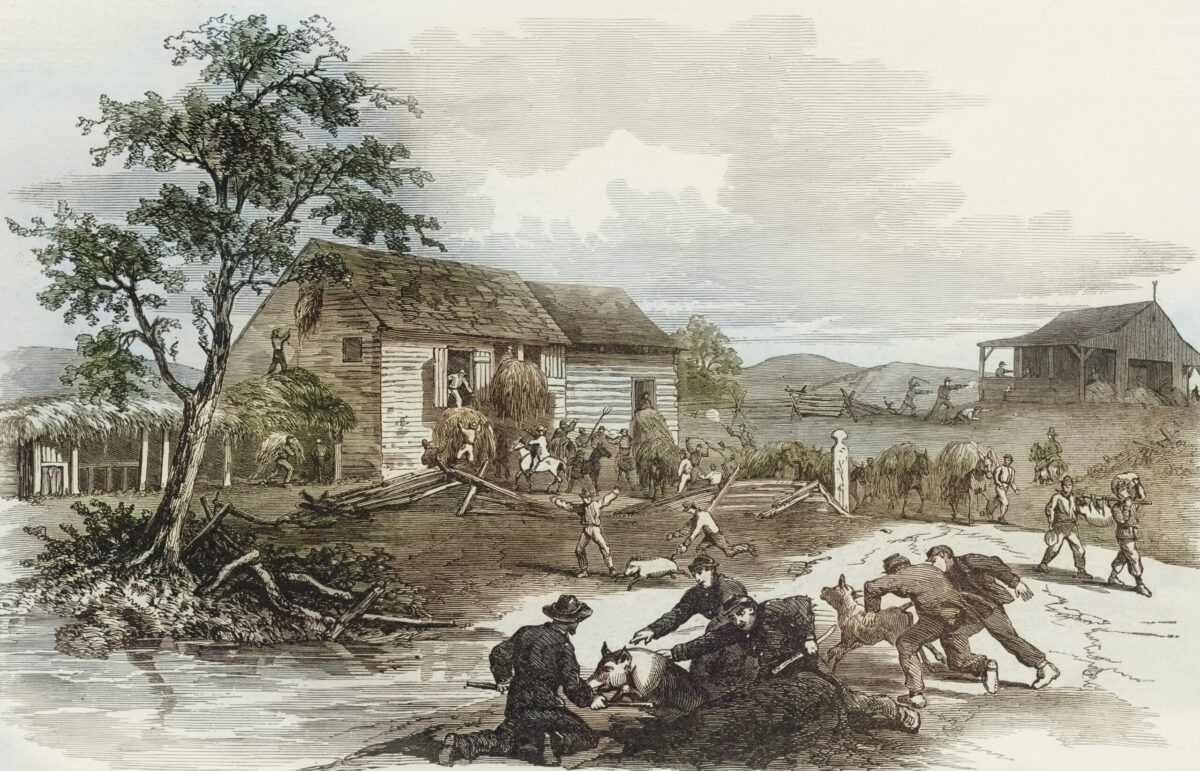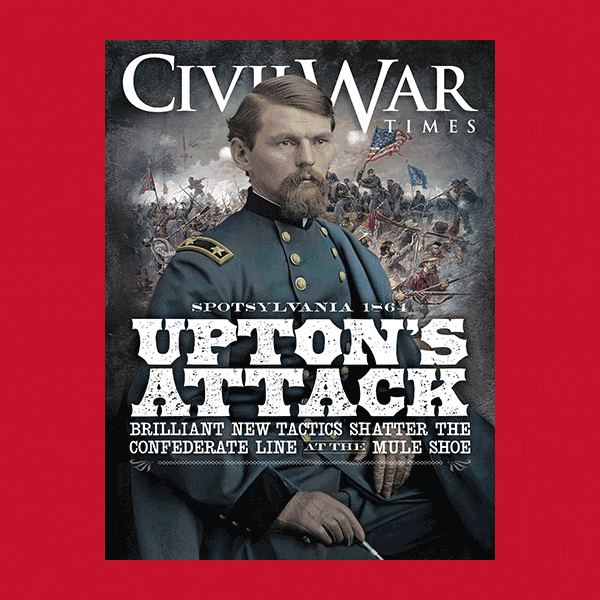Major General John Pope’s actions with the Army of Virginia resonated far beyond the battlefields of August 1862. Often dismissed as a blustering incompetent who supposedly announced his headquarters would be “in the saddle,” he experienced ignominious defeat at the Second Battle of Bull Run and then exile to the backwater of Minnesota. Few army commanders on either side inspired more scorn from contemporaries and subsequent historians. Yet Pope’s record in Virginia deserves serious attention as crucial to the shift from a restrained to a more all-encompassing style of war in the Eastern Theater. This shift, in turn, lessened the likelihood of a brokered peace that would restore the nation to anything resembling the prewar status quo.
Pope entered the Virginia theater at a pivotal moment. Orders creating his Army of Virginia on June 26, 1862, consolidated the commands of Maj. Gens. John C. Frémont, Nathaniel P. Banks, and Irvin McDowell, which had faced Maj. Gen. Thomas J. “Stonewall” Jackson in the Shenandoah Valley. Charged with defending Washington, Pope also was “in the speediest manner [to] attack and overcome the rebel forces under Jackson and [Richard S.] Ewell, and render the most effective aid to relieve General [George B.] McClellan and capture Richmond.” Less than a week after issuance of these orders, McClellan’s unforced retreat following the Seven Days’ Battles changed everything, persuading Abraham Lincoln and the U.S. Congress that the war would continue much longer and require more drastic measures to crush the Confederate military resistance. Pope soon found himself a leading actor amid a tectonic shift in the nation’s war aims and policies.
McClellan’s failure escalated debates about emancipation, the limits of “civilized” warfare, and the relationship between armies and civilians and their property. Such controversial topics had arisen earlier in Missouri, where Frémont had tried to confiscate slaves owned by pro-Confederates, and anti-Union depredations by irregular forces had prompted discussions between Maj. Gen. Henry W. Halleck and the German-born scholar Francis Lieber. Prompted by his exchanges with Halleck, Lieber later in the war codified the rules of war in a document signed by President Lincoln and issued as General Orders No. 100 in April 1863. Controversy in Missouri, a secondary military arena, was one thing—controversy in Virginia, where the most famous armies campaigned in proximity to the rival capitals, proved more explosive.
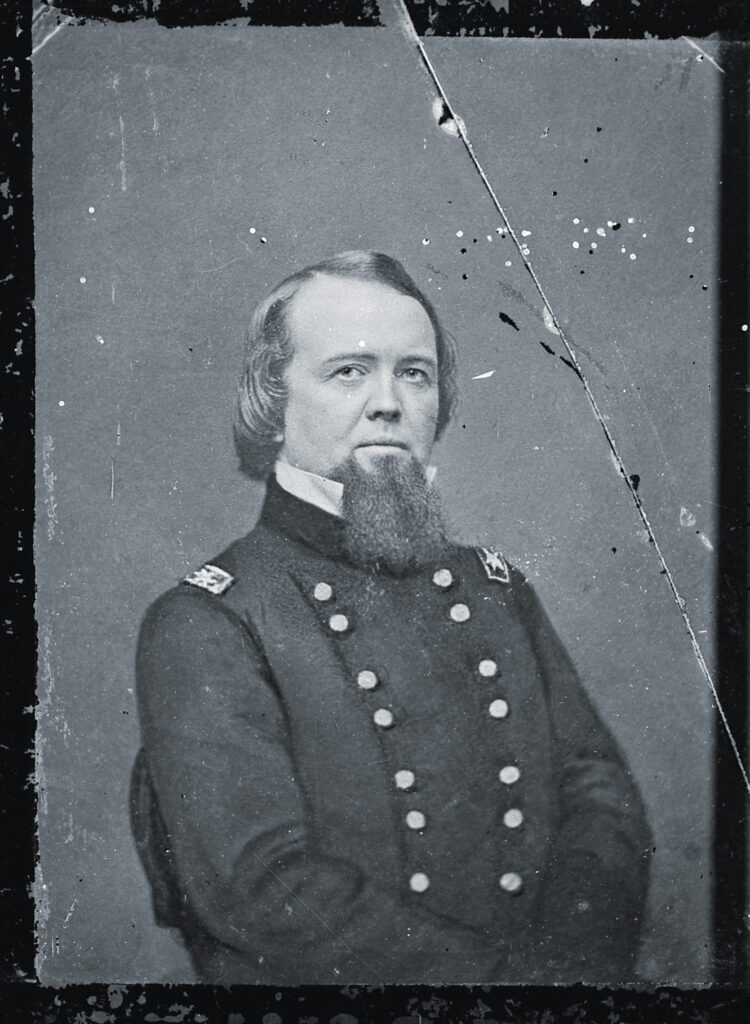
Within three weeks of McClellan’s withdrawal from Richmond to Harrison’s Landing on the James River, both Congress and Abraham Lincoln acted regarding emancipation. The Second Confiscation Act of July 17, 1862, freed slaves held by Rebel owners, authorized seizure of property from several categories of individuals, and empowered the president “to employ as many persons of African descent as he may deem necessary and proper for the suppression of this rebellion.” Senator Charles Sumner, a Radical Republican from Massachusetts, observed that “the Bill of Confiscation & Liberation, which was at last passed, under pressure from our reverses at Richmond, is a practical Act of Emancipation.”
Four days earlier, according to Secretary of the Navy Gideon Welles, the president discussed “the subject of emancipating the slaves by Proclamation in case the rebels did not cease to persist in their war on the govt’ and the Union, which he saw no evidence.” Lincoln believed “the reverses before Richmond, and the formidable power and dimensions of the insurrection which extended through all the Slave States…impelled the administration to adopt extraordinary measures to preserve the National existence.” At Cabinet meetings on July 21-22, 1862, Lincoln discussed emancipation and his intention to issue a proclamation.
These policies contrasted starkly with McClellan’s ideas. Shortly after the Battle of Malvern Hill, “Little Mac” offered the president a gratuitous tutorial about how to conduct the war. The United States should adhere to the “highest principles known to Christian Civilization,” insisted McClellan in what came to be called the “Harrison’s Landing letter.” The conflict “should not be, at all, a War upon population; but against armed forces and political organizations. Neither confiscation of property, political executions of persons, territorial organization of states or forcible abolition of slavery should be contemplated for a moment.”
On August 1, while still ensconced at Harrison’s Landing, McClellan wrote to General-in-Chief Halleck. “I believe that together we can save this unhappy country and bring this war to a comparatively early termination,” he stated, “the doubt in my mind is whether the selfish politicians will allow us to do so. I fear the results of the civil policy inaugurated by recent Acts of Congress and practically enunciated by General Pope in his series of orders to the Army of Virginia.”
New Orders
Pope issued three general orders between July 14 and 23 that drew on his prior experience in Missouri and signaled a sharp departure from McClellan’s conciliatory approach. The first, General Orders No. 5, instructed Union troops to “subsist upon the country in which their operations are carried on” without reimbursement to pro-Confederate owners. Next, General Orders No. 7 held people “throughout the area where the Army of Virginia campaigns” responsible for any damage to railroads, roads, and telegraph lines at the hands of “lawless bands of individuals not forming part of the organized forces of the enemy nor wearing the garb of soldiers.” Anyone connected to “such outrages, either during the act or at any time afterward, shall be shot, without awaiting civil processes.”
Finally, General Orders No. 11 instructed Union officers “immediately to arrest all disloyal male citizens within their lines or within their reach in rear of their respective stations.” Those who refused to take the oath of allegiance would be sent south beyond the pickets of the army and if subsequently found “within our lines or at any point in rear they will be considered spies, and subjected to the extreme rigor of military law.” Anyone who took the oath and later violated it “shall be shot, and his property seized and applied to the public use.”
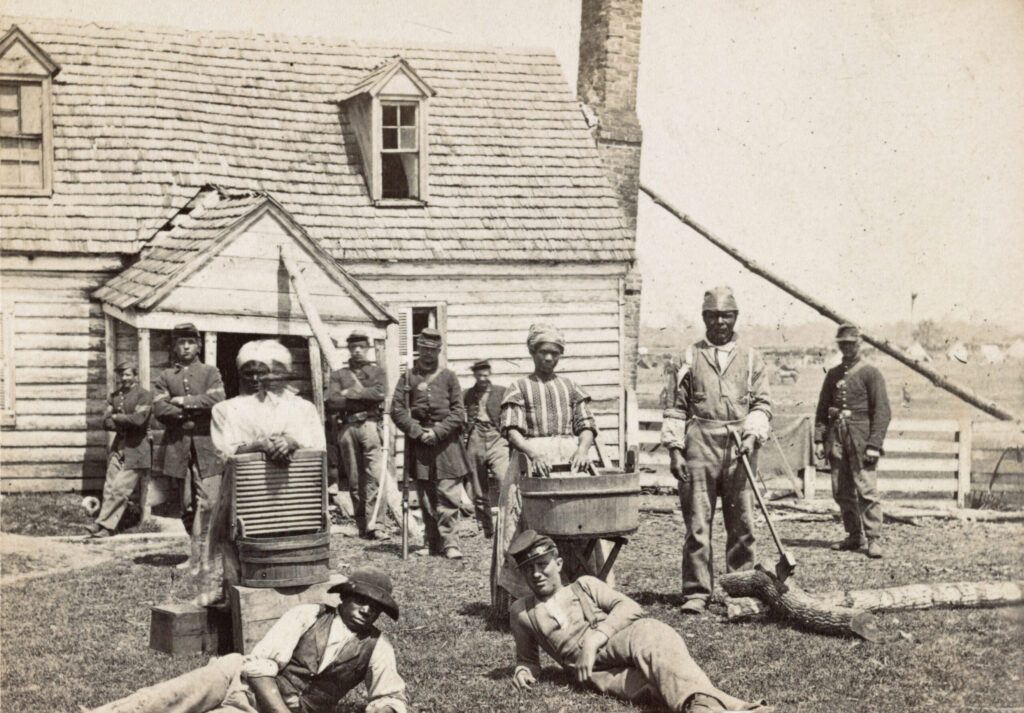
Pope’s thinking aligned with political leaders seeking harsher treatment of Confederates and their property. Lieutenant Colonel David W. Strother, who served on Pope’s staff, and Secretary of the Treasury Salmon P. Chase recorded impressions of the general in July. Although not an abolitionist, Pope told Strother “the war had necessarily given the death blow to slavery. Wherever the Union armies move, the old system of master and slave falls.” Describing Pope’s ideas as “clear and strong,” Strother added that his chief believed enslaved people “ought to be taken and used remorselessly whenever needed….They will not make soldiers but as laborers they might be extensively used.” Chase summarized Pope’s thinking about employing Black laborers in almost identical terms, while also observing that the new commander “expressed himself freely and decidedly in favor of the most vigorous measures in the prosecution of the war.”
Divided Opinion
Pope made no effort to disguise his low opinion of McClellan. “[H]e regarded it as necessary for the safety and success of his operations that there should be a change in the command of the Army of the Potomac,” noted Chase, because “Genl. McClellan’s incompetency and indisposition to active movements were so great….” Pope’s widely quoted message to the Army of Virginia on July 14, 1862, can best be read as a critique of McClellan’s type of warfare. “I have come to you from the West,” he began bluntly, “where we have always seen the backs of our enemies; from an army whose business it has been to seek the adversary and to beat him when he was found; whose policy has been attack and not defense.” In a direct slap at McClellan, Pope inveighed against a preoccupation with “‘taking strong positions and holding them,’ of ‘lines of retreat,’ and of ‘bases of supplies.’” Discard such ideas, he counseled, and instead “study the probable lines of retreat of our opponents, and leave our own to take care of themselves. Let us look before us, and not behind. Success and glory are in the advance, disaster and shame lurk in the rear.”
Many people in the loyal states responded favorably to Pope’s orders and attitude. William Swinton, a correspondent for The New York Times, believed Pope’s actions were popular in the loyal states. “[T]here is no doubt,” he wrote shortly after the war, “that the declaration of a more vigorous war-policy quite met the views of the mass of the people.” Representative quotations from newspapers in the summer of 1862 buttress Swinton’s view. In this vein, the Republican Chicago Tribune printed and endorsed the orders on July 22: “We like Gen. Pope and the way he falls to work in the Shenandoah . . . . [H]is orders have the right tone, and are based on the right principles of conducting the war. It has been severe enough upon loyal men; it is now proposed to render it unpleasing to the rebels.”
Two New York papers took similar stances. The largely Democratic New York Herald claimed the “commonest complaint from our soldiers…has been, that while standing guard over rebel property they have been liable to be shot down by rebel bushwhackers.” The measures Pope learned in fighting guerrillas in Missouri “appear to be working very well among the same customers in Virginia.” The New-York Daily Tribune, a Republican sheet, made the same point with greater emphasis from a special correspondent near Warrenton. “I cannot describe too strongly the intensity of the feeling among the soldiers of this Virginia army,” he wrote, “—how clearly they see, and how strongly they feel that they are fighting in an enemy country. They needed to be convinced that their commanders and the Government also appreciated their situation, and they find in these orders the assurance they have sought.”
Michigan’s Lansing State Republican will have the final word here. Under the heading “New Life in the Army,” its editor cheered: “There is no longer to be that extreme carefulness of the rights, and tenderness at the feelings of rebels, but they are hereafter to be treated as rebels….General Pope intends to make clean work as he goes. This policy will give new life and vigor to the army, and to the people of the loyal States. This looks like putting down the rebellion. Hurrah for General Pope!”
Many Union soldiers echoed such opinions. A New Yorker deployed near Warrenton, Va., who complained that nothing “is more galling to a patriot and Union loving man than to be compelled to guard the property of his enemies,” celebrated Pope’s orders as “a very important step toward ending the war. Until the rebels are made to feel the severity of the war, but little permanent success will be won by our arms.” Lieutenant John Meade Gould of the 10th Maine Infantry praised Pope’s policies as overdue. “It is positively proven that an easy policy is a poor one,” he insisted from near Chester Gap, Va., “the natives laugh at us, jibe us, and when we are gone, pick up our stragglers and sick….WAR is a great and terrible game….Let the terror be with our enemies and not among ourselves.”
Disgust and Anger
McClellan’s loyalists, in contrast, lambasted Pope. They often opposed emancipation and tougher policies regarding Confederate civilians, while also bridling at what they deemed sneering allusions to the Army of the Potomac’s passivity. None vented more fulsomely than Brig. Gen. Marsena R. Patrick, who served as military governor of Fredericksburg in May–June 1862 and later led a brigade in the field. Pope’s orders “demoralized the Army,” the New Yorker noted in his diary on July 18, “& Satan has been let loose” among soldiers who pillaged at will.
About a month later, Patrick pronounced himself “so utterly disgusted that I feel like resigning & letting the whole thing go—I am afraid of God’s Justice, for our Rulers & Commanders deserve his wrath & curse—” Lieutenant Charles Francis Adams Jr., whose family boasted two presidents and the current U.S. representative to Great Britain, spoke in Washington with members of McClellan’s and Halleck’s staffs and concluded “that Pope is a humbug and known to be so by those who put him in his present place.” “I still believe in McClellan,” affirmed Adams, “but I know that the nearest advisers of the President…distrust his earnestness in this war.”
Criticism emanated from within the Army of Virginia as well. Brig. Gen. Alpheus S. Williams castigated Pope after Second Bull Run: “It can with truth be said of him that he had not a friend in his command from the smallest drummer boy to the highest general officer. All hated him.” Reaching a hyperbolic crescendo, Williams spewed “that more insolence, superciliousness, ignorance, and pretentiousness were never combined in one man.” Lieutenant Robert Gould Shaw of the 2nd Massachusetts Infantry, who like Williams served in Banks’ 2nd Corps, also took a scolding position. “Pope criticizes and abuses McClellan with a will,” he observed on August 3, “showing in a man in his position no better taste than appeared in his proclamation and some of his orders….He looks just what we have always understood he was,—a great blow-hard, with no lack of confidence in his own powers.”
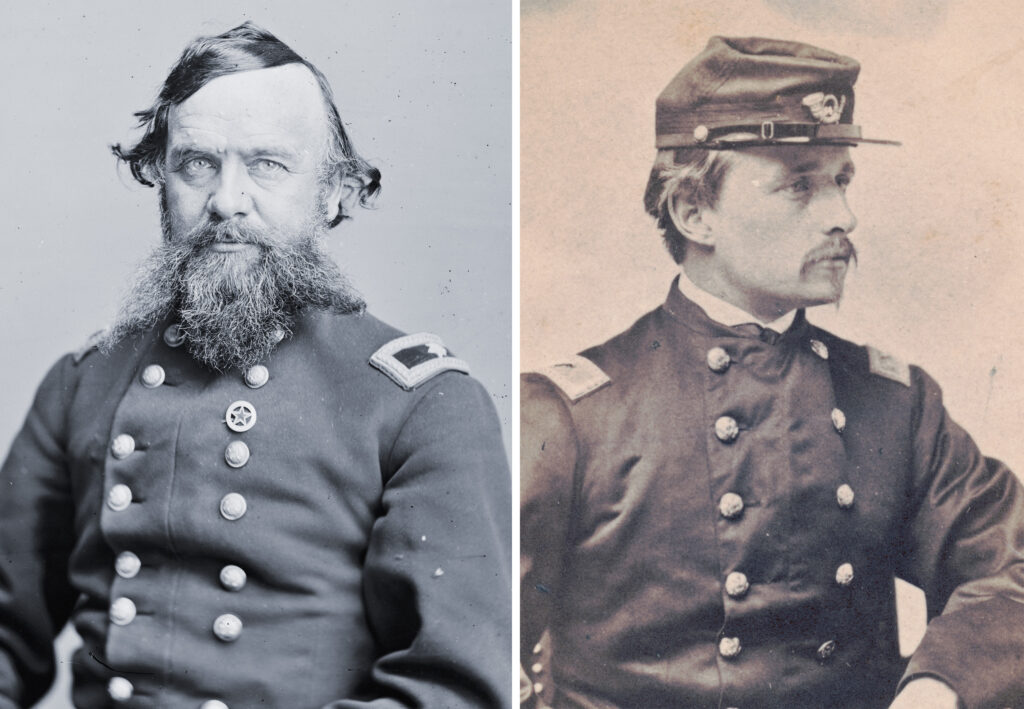
George B. McClellan refused even to wish for Pope to succeed against the Rebels. “I have a strong idea that Pope will be thrashed during the coming week—& very badly whipped he will be & ought to be,” McClellan wrote on August 10 in language that flirted with disloyalty, “—such a villain as he is ought to bring defeat upon any cause that employs him.” Two days earlier, he had denounced Pope and the war’s new direction. “I will issue tomorrow an order giving my comments on Mr. Jno Pope,” he told his wife, “—I will strike square in the teeth of all his infamous orders & give directly the reverse instructions to my army—forbid all pillaging & stealing & take the highest Christian ground for the conduct of the war—let the Govt gainsay it if they dare.”
Confederate reactions underscored the powerful ramifications of Pope’s short tenure with the Army of Virginia. On July 22, the United States and the Confederacy agreed to a cartel stipulating “that all prisoners of war hereafter taken shall be discharged on parole till exchanged.” Nine days later, an indignant Jefferson Davis wrote to Lee regarding the “general order issued by Major General Pope on the 23rd of July.” Because of that directive, the Confederate government recognized “General Pope and his commissioned officers to be in the position…of robbers and murderers, and not that of public enemies entitled if captured to be considered as prisoners of war.” For the present, the Confederacy would forego retaliation against Pope’s enlisted soldiers and treat them as prisoners of war. Should the United States continue its “savage practices,” however, “we shall reluctantly be forced to the last resort of accepting war on the terms chosen by our foes, until the outraged voice of a common humanity forces respect for the recognized rules of war.”
On August 1, Davis instructed Robert E. Lee to seek details from the Union general-in-chief about “alleged murders committed on our citizens by officers of the U.S. Army”—including one in Missouri supposedly ordered by Pope. Lee was instructed to allow Halleck 15 days from receipt of the query to reply; failure to do so would set in motion “retributive or retaliatory measures which we shall adopt to put an end to the merciless atrocities which now characterize the war waged against us.”
The Confederate War Department issued General Orders No. 54 that same day. It quoted part of Pope’s General Orders No. 11 and another authored by Brig. Gen. Adolph von Steinwehr on July 13 to show that the United States had “determined to violate all the rules and usages of war and to convert the hostilities hitherto waged against armed forces into a campaign of robbery and murder against unarmed citizens and peaceful tillers of the soil….” If captured, Pope, von Steinwehr, and their subalterns would not be treated as the recent cartel mandated but held in “close confinement so long as the orders aforesaid shall continue in force and unrepealed by the competent military authorities of the United States….” Should the Federals murder any unarmed Confederate civilians under Pope’s orders, whether with or without trial, an equal number of U.S. officers held in custody would be hanged.
On August 18, Davis sent a message to the Confederate Congress accusing the United States of “Rapine and wanton destruction of private property, war upon noncombatants, murder of captives, bloody threats to avenge the death of an invading soldiery by the slaughter of unarmed citizens, [and] orders of banishment against peaceful farmers.”
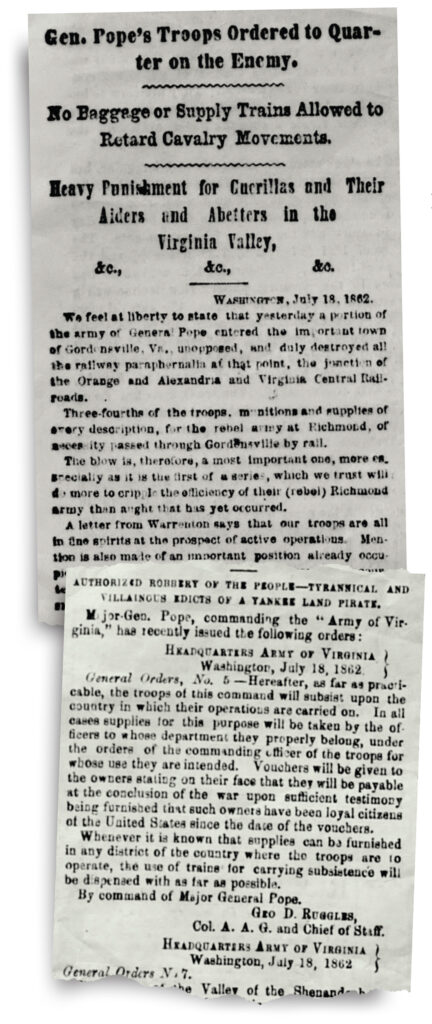
That Pope did not enforce his orders on a grand scale made little difference. Perception rather than reality held sway, as is almost always the case, and Confederates reacted with a spasm of anger to the threats inherent in the orders and to specific instances of Federal arrests and confiscation. Meanwhile, the increased movement of enslaved refugees toward Pope’s lines inflamed fears of the consequences of emancipation. Confederates coalesced with an outraged sense of purpose, determined to resist a foe who threatened every aspect of their social and economic structures.
Newspapers across the Confederacy engaged in a carnival of outrage that instigated popular fury directed at Pope. Two examples illustrate this phenomenon. On July 24, the Richmond Daily Dispatch printed Pope’s three orders under the heading “GEN. POPE’S ARMY / VIRGINIA TO BE LAID WASTE.” In early August, this paper expressed a hope “to see this execrable villain and his lieutenant[s] expiate their crimes on the gallows.” In North Carolina, Winston’s Western Sentinel deprecated Pope and his “execrable order which exposes all sexes and ages to the severest cruelties of ruffian Yankee troops.” The editor further observed that “North Carolina has hitherto been exempt from the operations of these brutal military decrees . . . only because the minions of Lincoln in this State have not had the force at command to enforce their execution.”
Robert E. Lee joined countless Confederates who read the texts of Pope’s orders in newspapers. He related that his son Rob was “off with Jackson & I hope will catch Pope & his cousin Louis Marshall. I could forgive the latter for fighting against us, if he had not have joined such a miscreant as Pope.” Lee’s use of the word “miscreant” bears close attention. Its mid-19th century meanings, according to the Oxford English Dictionary, included “Misbelieving, heretical; unbelieving, infidel” and “A vile wretch; a villain, rascal.”
Others selected comparably harsh epithets for Pope and his troops. A Catholic priest with the 14th Louisiana Infantry deplored “Pope’s abolition robbers,” while a British-born soldier stated that “our men heartily hated him for his ruthless cruelty to the inhabitants of the country, and his extraordinary amount of vanity and bombast.” Colonel Josiah Gorgas, the Confederate chief of ordnance, called Pope the “morally worthless” author of “infamous orders holding citizens responsible for the shooting of his men by guerrillas, or rangers.”
Women left ample testimony about the impact of Pope’s orders, much of which alluded to what newspapers decried as the “uncivilized” and “savage” conduct of Union soldiers. For Lucy Buck, living near Front Royal, the reality of General Orders No. 11 exceeded her worst imaginings. “This is what I have all the time been dreading,” she wrote on July 26, “and now it had come in a more hideous shape than I had ever anticipated.” Neighbors agreed: “We met Mr. Hope and Mr. Hainie and the former had been weeping and seemed to be utterly bewildered by the shock. Oh how intensely I did hate the whole race of Yankees.”
A diarist from outside Virginia reflected the national interest in Pope and his orders. Kate Edmondston clipped the texts of General Orders No. 5 and No. 7 from a newspaper and pasted them in her journal. “Gen. Pope has issued an order…monstrous in its cruelty and contrary to the practices of all civilized warfare,” she commented with obvious anger, “but this is not civilized warfare, nor do our enemies show either the genius of Christianity or the spirit of Civilization.”
Anyone interested John Pope’s impact in Virginia must look beyond the battlefield. His inept tactical performance and defeat at Second Bull Run, however embarrassing, shaped Union military fortunes in only a transitory way. Campaigning in Maryland almost immediately seized the spotlight, relegating operations in July and August to a secondary position they hold to this day. The ratcheting up of animosities during those two months proved far more consequential.
Pope’s orders and conduct played a crucial role in this process, evident in the Eastern Theater and on the respective home fronts, which heralded a kind of war that could engulf untold noncombatants. Lincoln’s preliminary and final proclamations of emancipation, the sack of Fredericksburg by Union soldiers during the Fredericksburg campaign, and other episodes left little doubt that George B. McClellan’s sort of war had ended. The stakes had been raised, hatreds stoked, and the stage set for elemental social, cultural, and ideological disruptions.

